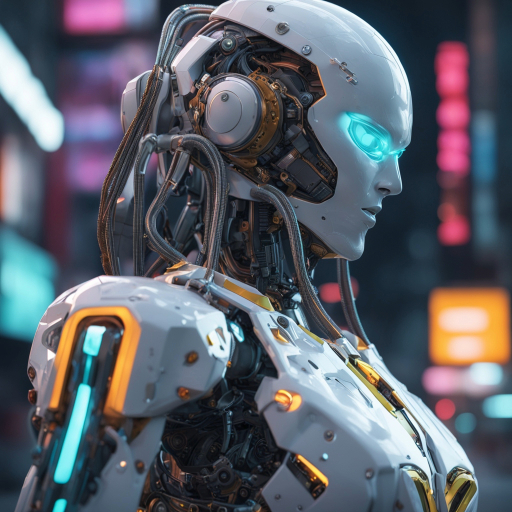The Future of AI in Everyday Life: Transforming Our World
Artificial Intelligence (AI) has evolved from a futuristic concept to a tangible reality that permeates various aspects of our daily lives. As technology advances at an unprecedented pace, AI is poised to revolutionize how we live, work, and interact. This article delves into the future of AI in everyday life, exploring its potential benefits, challenges, and the ways it will shape our world.
AI in Healthcare: Revolutionizing Medical Care
AI’s impact on healthcare is profound and multifaceted. From diagnostics to treatment plans, AI systems are enhancing medical care by providing more accurate and timely information. For instance, AI-powered imaging tools can detect diseases such as cancer at an early stage, improving patient outcomes. Additionally, AI algorithms can analyze vast amounts of medical data to identify patterns and predict patient deterioration, enabling proactive interventions.
Moreover, AI-driven telemedicine platforms are making healthcare more accessible, especially in remote areas. These platforms allow patients to consult with healthcare providers via video calls, reducing the need for physical visits and ensuring timely medical advice.
Smart Homes: Enhancing Convenience and Efficiency
The concept of smart homes is becoming increasingly popular, with AI at its core. Smart home devices, such as voice-activated assistants (e.g., Amazon Alexa, Google Assistant), smart thermostats, and automated lighting systems, are designed to make daily tasks more convenient and efficient. These devices learn from user behaviors and preferences to provide personalized experiences.
For instance, AI-powered thermostats can adjust the temperature based on occupancy patterns and weather forecasts, optimizing energy consumption and reducing utility bills. Similarly, smart lighting systems can adapt to natural light levels and user activities, creating a comfortable living environment.
AI in Transportation: Driving the Future
The transportation sector is undergoing a significant transformation, driven by AI. Autonomous vehicles, once a distant dream, are now a reality. Companies like Tesla, Waymo, and Uber are developing self-driving cars that promise to enhance road safety, reduce traffic congestion, and provide mobility solutions for those unable to drive
AI-powered traffic management systems are also improving urban mobility. These systems analyze real-time traffic data to optimize traffic flow, reduce travel times, and minimize carbon emissions. In the future, AI could enable the seamless integration of various modes of transportation, creating a more efficient and sustainable urban transit network.
AI in Education: Personalizing Learning Experiences
Education is another domain where AI is making significant strides. AI-powered educational tools are personalizing learning experiences, catering to individual students’ needs and learning styles. Adaptive learning platforms, for example, use AI to assess students’ strengths and weaknesses, providing customized learning paths and resources.
Furthermore, AI-driven chatbots and virtual tutors are offering round-the-clock assistance to students, answering questions, and providing feedback on assignments. This ensures that students receive timely support, enhancing their learning outcomes.
AI in Finance: Transforming Financial Services
The financial industry is leveraging AI to enhance various aspects of its operations. AI algorithms are used for fraud detection, risk management, and investment strategies. By analyzing transaction patterns and financial data, AI systems can identify fraudulent activities in real-time, protecting consumers and financial institutions from potential losses.
Robo-advisors, powered by AI, are democratizing investment management by providing personalized financial advice at a lower cost compared to traditional financial advisors. These platforms analyze users’ financial goals, risk tolerance, and market trends to recommend tailored investment portfolios.
AI and Privacy: Navigating Ethical Challenges
While the future of AI is promising, it also raises ethical and privacy concerns. AI systems rely on vast amounts of data to function effectively, which poses risks related to data security and privacy. Ensuring that AI systems are transparent, accountable, and unbiased is crucial to gaining public trust and preventing misuse.
Governments and organizations must establish robust regulatory frameworks and ethical guidelines to address these challenges. By doing so, they can harness the benefits of AI while mitigating potential risks.
The Future Landscape: AI Integration Across Industries
As AI technology continues to evolve, its integration across various industries will become more seamless and widespread. Industries such as retail, entertainment, agriculture, and manufacturing are already exploring AI applications to improve efficiency, enhance customer experiences, and drive innovation.
In retail, AI-driven recommendation systems are personalizing shopping experiences, while AI-powered inventory management systems optimize supply chains. In agriculture, AI is being used for precision farming, helping farmers make data-driven decisions to increase crop yields and reduce resource consumption.
Conclusion: Embracing the AI-Driven Future
The future of AI in everyday life is bright, with its potential to transform various aspects of our world. From healthcare and education to transportation and finance, AI is poised to enhance our quality of life, increase efficiency, and drive innovation. However, navigating the ethical and privacy challenges associated with AI is crucial to ensuring its responsible and beneficial use.
As we embrace this AI-driven future, it is essential to remain vigilant and proactive in addressing the challenges while leveraging the opportunities that AI presents. By doing so, we can create a future where AI enhances our lives, fosters growth, and drives progress.


